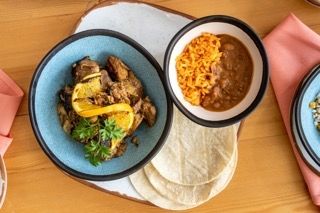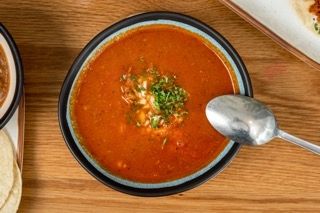Is Mexican Food Healthy And Balanced? Unboxing the Nutritional Perks of Conventional Ingredients
The concern of whether Mexican food is healthy welcomes an expedition of its typical ingredients. Beans and corn function as fundamental staples, abundant in protein and fiber. Avocados offer valuable fats, while different herbs and spices add taste and health advantages - freshly made guacamole. With each other, these components develop a tapestry of nutrition. The healthiness of Mexican cuisine typically depends on prep work techniques and section dimensions. What function do these elements play in determining its general dietary value?
The Power of Beans: Healthy Protein and Fiber-Rich Staples
Although typically ignored, beans serve as a keystone of Mexican food, providing a riches of dietary benefits. Rich in protein, they are a superb plant-based alternative for those looking for to satisfy their dietary healthy protein requires. This high protein material sustains muscular tissue repair and development, making beans very useful for both meat-eaters and vegetarians alike. In addition, beans are an exceptional source of dietary fiber, which helps in digestion and advertises a feeling of volume, potentially assisting with weight administration.
The variety of beans made use of in Mexican recipes, such as black beans, pinto beans, and kidney beans, adds to a diverse flavor profile and can improve meals nutritionally. Furthermore, beans are reduced in fat and have vital minerals and vitamins, consisting of magnesium, iron, and folate. With each other, these attributes make beans an essential ingredient, delivering both nutrients and nutrition in traditional Mexican fare.
Corn: a Versatile Grain With Nutritional Conveniences
Corn stands apart as a flexible grain basic to Mexican cuisine, celebrated not only for its cooking applications yet also for its impressive dietary profile. As a main component in dishes like tortillas, tamales, and pozole, corn provides important nutrients that add to a balanced diet regimen. Rich in carbs, it serves as a substantial energy source, while likewise being low in fat, making it a desirable alternative for various nutritional requirements.
Corn is a good source of nutritional fiber, which helps in food digestion and promotes satiety. It has substantial quantities of vitamins such as B-complex vitamins, which are crucial for energy metabolic rate. The visibility of anti-oxidants, specifically carotenoids, contributes to overall health by decreasing oxidative stress. Furthermore, corn is gluten-free, dealing with those with gluten sensitivities. In general, the nutritional advantages of corn highlight its relevance in traditional Mexican food and its role in a healthy diet.
Avocados: Healthy Fats and Nutrients in Every Bite
Avocados play a significant duty in Mexican food, complementing dishes with their velvety texture and abundant flavor. Beyond their cooking charm, avocados are commemorated for their impressive dietary account. They are a rich source of healthy and balanced monounsaturated fats, which can aid lower poor cholesterol levels and assistance heart wellness. In addition, avocados are loaded with necessary vitamins and minerals, consisting of potassium, vitamin E, and B vitamins, adding to overall health.
The high fiber material in avocados help food digestion and advertises satiety, making them a valuable enhancement to any dish. Their one-of-a-kind nutrient structure can likewise sustain skin health and wellness and give anti-inflammatory benefits. Incorporating avocados right into typical Mexican dishes or appreciating them as a standalone treat can enhance click here to read both taste and nutrition, demonstrating why they are a precious staple in Mexican food. In general, avocados offer a delicious way to delight in healthy fats and important nutrients in every bite.

Spices and Herbs: Flavorful Wellness Boosters
While taking pleasure in the rich flavors of Mexican cuisine, one can not ignore the essential duty that spices and natural herbs play in enhancing both preference and health. Ingredients such as oregano, chili, and cilantro peppers not just add to the vivid flavor account but likewise offer considerable health and wellness advantages. Cilantro is understood for its detoxifying homes, helping to eliminate hefty steels from the body, while oregano is loaded with antioxidants and possesses anti-inflammatory effects.
Chili peppers, a staple in lots of Mexican dishes, consist of capsaicin, which has been connected to enhanced metabolic rate and pain alleviation. Additionally, spices like cumin and coriander assistance digestion and may aid in blood sugar level policy. Incorporating these tasty health and wellness boosters into dishes not just enhances the cooking experience however additionally advertises general well-being, making Mexican food not just scrumptious, but additionally nutritionally advantageous.
Typical Food Preparation Techniques: Enhancing Nutrition and Taste
Typical cooking methods in Mexican food play a vital role in boosting both nourishment and taste, as they usually focus on fresh components and time-honored methods. Techniques such as nixtamalization, where corn is saturated and cooked in an alkaline service, not only improve the nutrient account of tortillas but also improve their digestibility - take out and delivery. Additionally, the usage of slow-moving food preparation approaches, like cooking or braising, permits flavors to fuse perfectly while preserving the integrity of the ingredients

Often Asked Concerns
Are Mexican Food Portions Commonly Larger Than Various Other Foods?
Mexican food sections are often larger than those of many various other foods. This characteristic shows conventional dining techniques, highlighting public sharing and hearty dishes, which Continue can result in a much more substantial offering size overall.
Just how Does the Prep Work Technique Affect Healthiness of Mexican Food?
Preparation approaches significantly influence the healthfulness of Mexican food. Methods such as grilling or steaming protect nutrients, while frying can increase harmful fat web content. Options of components and cooking designs inevitably identify general nutritional value.
Can Mexican Food Be Customized for Details Dietary Constraints?
Mexican food can certainly be tailored for details dietary limitations. Substitutions, such as using corn tortillas for gluten-free diet regimens or including more vegetables, make it possible for individuals to delight in standard flavors while accommodating numerous nutritional needs.
What Prevail False Impressions About Mexican Food and Wellness?
Common misconceptions about Mexican food include the try this belief that it is naturally harmful, excessively zesty, and entirely concentrated on fats. In truth, conventional dishes commonly include nutritious components and can be customized to various nutritional demands.
Are There Much Healthier Choices at Mexican Restaurants?
Much healthier choices at Mexican restaurants usually include grilled meats, beans, and fresh veggies. Selecting recipes that stress whole active ingredients and avoiding hefty sauces can result in an extra nourishing dining experience, advertising total well-being.
The range of beans utilized in Mexican dishes, such as black beans, pinto beans, and kidney beans, adds to a diverse flavor profile and can boost meals nutritionally. Avocados play a considerable function in Mexican food, enhancing dishes with their luscious texture and rich taste. Including avocados into conventional Mexican recipes or enjoying them as a standalone treat can enhance both taste and nutrition, demonstrating why they are a precious staple in Mexican food. While appreciating the rich tastes of Mexican food, one can not forget the essential role that spices and herbs play in enhancing both taste and health and wellness. Standard cooking methods in Mexican cuisine play an important duty in enhancing both nourishment and taste, as they commonly focus on time-honored strategies and fresh ingredients.